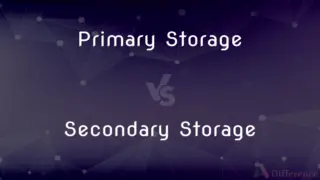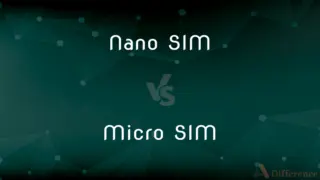Scada vs. Telemetry — What's the Difference?
By Urooj Arif & Fiza Rafique — Updated on April 18, 2024
SCADA systems monitor and control industrial processes locally, while telemetry gathers and transmits data over long distances, typically for monitoring.

Difference Between Scada and Telemetry
Table of Contents
ADVERTISEMENT
Key Differences
SCADA (Supervisory Control and Data Acquisition) systems are crucial for industrial operations as they provide centralized control and real-time data analysis of a site's equipment. Telemetry, on the other hand, focuses on the transmission of data from remote sensors to a central system, enabling monitoring without physical presence.
SCADA systems are often used in environments like manufacturing plants, water treatment facilities, and power plants, where real-time intervention is necessary. Whereas telemetry is vital in sectors like meteorology, wildlife tracking, and remote utility metering, where data needs to be collected from far-flung locations.
In SCADA, data acquisition happens in real-time, and the systems are designed to handle high-speed data and control commands to manage the processes efficiently. Telemetry systems are generally slower, prioritizing reliable transmission over vast distances rather than rapid response.
SCADA integrates both control and monitoring functionalities, making it possible to automate processes based on the data collected. Telemetry, however, usually serves a singular purpose—data collection and transmission, leaving the decision-making and control actions to be taken based on the analyzed data elsewhere.
Both SCADA and telemetry use various communication technologies, but SCADA systems are typically more complex, requiring robust networks capable of handling not only data aggregation but also detailed command functionalities. Telemetry systems mainly require reliable long-range communication technologies like satellite or radio frequencies.
ADVERTISEMENT
Comparison Chart
Primary Function
Control and monitor industrial processes
Transmit data from remote locations
Usage Contexts
Industrial plants, utilities
Environmental monitoring, remote sensing
Data Handling
Real-time processing and control
Data collection and remote transmission
Speed
High-speed responses required
Lower speed, focus on reliability
Communication Complexity
High, integrating control commands
Lower, primarily data transmission
Compare with Definitions
Scada
Centralizes data collection and process control in one location.
The plant's SCADA system centralized all control rooms into one command center.
Telemetry
Focuses on long-distance data communication.
Telemetry systems transmit drilling data from offshore oil rigs.
Scada
Allows for real-time intervention in processes.
SCADA systems detect anomalies and initiate corrective actions immediately.
Telemetry
The technology of automatic measurement and transmission of data from remote sources.
Wildlife biologists use telemetry to track migration patterns.
Scada
A system used for monitoring and controlling industrial processes.
A SCADA system in a power plant monitors turbine temperatures and adjusts settings automatically.
Telemetry
Provides data access without physical presence.
Meteorologists use telemetry to gather weather data from unmanned stations.
Scada
Used extensively in utilities management.
SCADA systems manage the flow and treatment of water in municipal systems.
Telemetry
Involves data transmission via technologies like radio, satellite, or internet.
The spacecraft uses telemetry to send data back to Earth.
Scada
Integrates hardware and software elements.
SCADA software processes data from sensors on the factory floor.
Telemetry
Used in various applications from environmental monitoring to medicine.
Telemetry devices monitor patients' heart rates remotely.
Scada
Scada is a genus of clearwing (ithomiine) butterflies, named by William Forsell Kirby in 1871. They are in the brush-footed butterfly family, Nymphalidae.
Telemetry
Telemetry is the in situ collection of measurements or other data at remote points and their automatic transmission to receiving equipment (telecommunication) for monitoring. The word is derived from the Greek roots tele, "remote", and metron, "measure".
Telemetry
The science and technology of automatic measurement and transmission of data by wire, radio, or other means from remote sources, as from space vehicles, to receiving stations for recording and analysis.
Telemetry
Biotelemetry.
Telemetry
(applied sciences) The science, and associated technology, of the automatic recording and transmission of data from a remote source to a receiving station for analysis.
Telemetry
The science or process of making remote measurements and sending the data by radio; the use of a telemeter.
Telemetry
Automatic transmission and measurement of data from remote sources by wire or radio or other means
Common Curiosities
Which is more complex, SCADA or telemetry?
SCADA systems are generally more complex due to their integrated control and monitoring capabilities.
What is telemetry?
Telemetry involves the automated communication of measurements and data from remote or inaccessible points to receiving equipment for monitoring.
What types of data does telemetry transmit?
Telemetry transmits various types of data like temperature, pressure, and location coordinates.
How does telemetry enhance remote monitoring?
Telemetry allows for the monitoring of remote locations without the need for physical presence, which is essential in areas like meteorology and wildlife tracking.
What is SCADA?
SCADA stands for Supervisory Control and Data Acquisition, a system used to control and monitor industrial processes.
Can telemetry be part of a SCADA system?
Yes, telemetry can be used within a SCADA system to enhance data collection capabilities from distant locations.
How do SCADA and telemetry differ in application?
SCADA is primarily used in industrial settings like factories, whereas telemetry is used in a wider range of fields including environmental science and healthcare.
What types of industries use SCADA?
Industries such as manufacturing, energy, and utilities commonly use SCADA systems.
Is SCADA used for real-time operations?
Yes, SCADA systems are designed for real-time monitoring and control of industrial processes.
What communication technologies are used in telemetry?
Common technologies include satellite, radio waves, and sometimes cellular networks are used in telemetry.
Share Your Discovery

Previous Comparison
Plain vs. Plateau
Next Comparison
Cebuano vs. VisayanAuthor Spotlight
Written by
Urooj ArifUrooj is a skilled content writer at Ask Difference, known for her exceptional ability to simplify complex topics into engaging and informative content. With a passion for research and a flair for clear, concise writing, she consistently delivers articles that resonate with our diverse audience.
Co-written by
Fiza RafiqueFiza Rafique is a skilled content writer at AskDifference.com, where she meticulously refines and enhances written pieces. Drawing from her vast editorial expertise, Fiza ensures clarity, accuracy, and precision in every article. Passionate about language, she continually seeks to elevate the quality of content for readers worldwide.















































